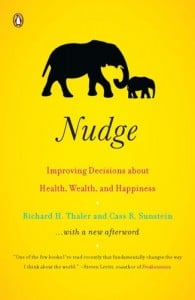 The federal government is hiring a so-called “nudge squad” to “scientifically” manipulate the behavior of American citizens. What could possibly go wrong?
The federal government is hiring a so-called “nudge squad” to “scientifically” manipulate the behavior of American citizens. What could possibly go wrong?
Fox News has the story: “The federal government is hiring what it calls a ‘Behavioral Insights Team’ that will look for ways to subtly influence people's behavior” along lines suggested by the book Nudge by Richard H. Thaler and Cass R. Sunstein. A professor who received the government’s offer to join this team called it the “nudge squad,” Fox reports.
But the government’s proper role is not to “nudge” us into behaving in ways of which politicians and bureaucrats approve; it is to recognize and protect our rights, including our rights to produce wealth in accordance with our own judgment and to keep and spend our wealth as we deem best. When the government employs the coercion of taxes or regulations to “nudge” us to act one way or another, it violates our rights.
Consider some of the ways:
- Nudging bureaucrats aim to increase college enrollment by offering “streamlined personal assistance” with federal student aid forms. Federal aid, the program on behalf of which the “nudging” in question is done, violates rights by forcibly seizing wealth from those who earn it and handing it to select students who didn’t earn it. Properly, government plays no role in education—except to protect people from force, fraud, and the like.
- Government nudgers seek to encourage people to save more by automatically enrolling them in savings programs and automatically increasing the level of savings over time. (Individuals who wish to opt out must take action to do so.) This violates rights by using tax policy—forcible confiscation of wealth—to create investment programs, 401(k)s and the like, regulated by the federal government. Properly, government plays no role in directing or incentivizing people’s actions regarding savings.
- The U.S. government’s advertisement seeking employees for the “nudge squad” approvingly cites a British program that aims to increase the installation of energy-conserving attic insulation by “offering an attic-clearance service (at full cost).” This program violates rights by using taxpayer dollars (or pounds) to promote a service properly left entirely to the free, non-coerced marketplace.
The Fox story and the government advertisement discuss numerous other examples of existing and potential programs to “nudge” Americans’ behavior, and no doubt the “nudge squad,” once entrenched as a formal bureaucracy, will think of unlimited more applications. Indeed, the government advertisement encourages new “nudge squad” employees to come up with “new ideas” for how to implement “behavioral insights” through federal policy.
 The nudges discussed in the cited documents are bad enough; even worse is that a government with the power and inclination to “nudge” our behavior by violating our rights will soon violate rights in increasingly severe ways. As economist Jerry Ellig told Fox, “nudges can turn into shoves pretty quickly.” A government with the power to “nudge” us into going to college, saving more, installing attic insulation, and the like, is a government with the power to determine what we may study in college, dictate how we must invest our wealth, decide how large a house we live in, and violate rights in a potentially unlimited number of other ways.
The nudges discussed in the cited documents are bad enough; even worse is that a government with the power and inclination to “nudge” our behavior by violating our rights will soon violate rights in increasingly severe ways. As economist Jerry Ellig told Fox, “nudges can turn into shoves pretty quickly.” A government with the power to “nudge” us into going to college, saving more, installing attic insulation, and the like, is a government with the power to determine what we may study in college, dictate how we must invest our wealth, decide how large a house we live in, and violate rights in a potentially unlimited number of other ways.
Undoubtedly a scientific approach to management can be useful in private business as well as in government. But, insofar as the government violates rights—as the “nudge squad” obviously aims to do—it violates the only proper purpose of government.
America does not need a “nudge squad”; it needs a rights squad—a squad of citizens who demand loudly and consistently, by word and by vote, that the government stop violating and start exclusively protecting individual rights.
Like this post? Join our mailing list to receive our weekly digest. And for in-depth commentary from an Objectivist perspective, subscribe to our quarterly journal, The Objective Standard.
Related:
- Review: Nudge: Improving Decisions About Health, Wealth, and Happiness, by Richard H. Thaler and Cass R. Sunstein
- Cass Sunstein and the “Second Bill of Rights” Seek to Obliterate Rights


![[TEST] The Objective Standard](https://test.theobjectivestandard.com/wp-content/uploads/2017/10/logo.png)










